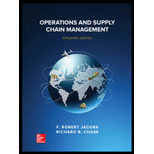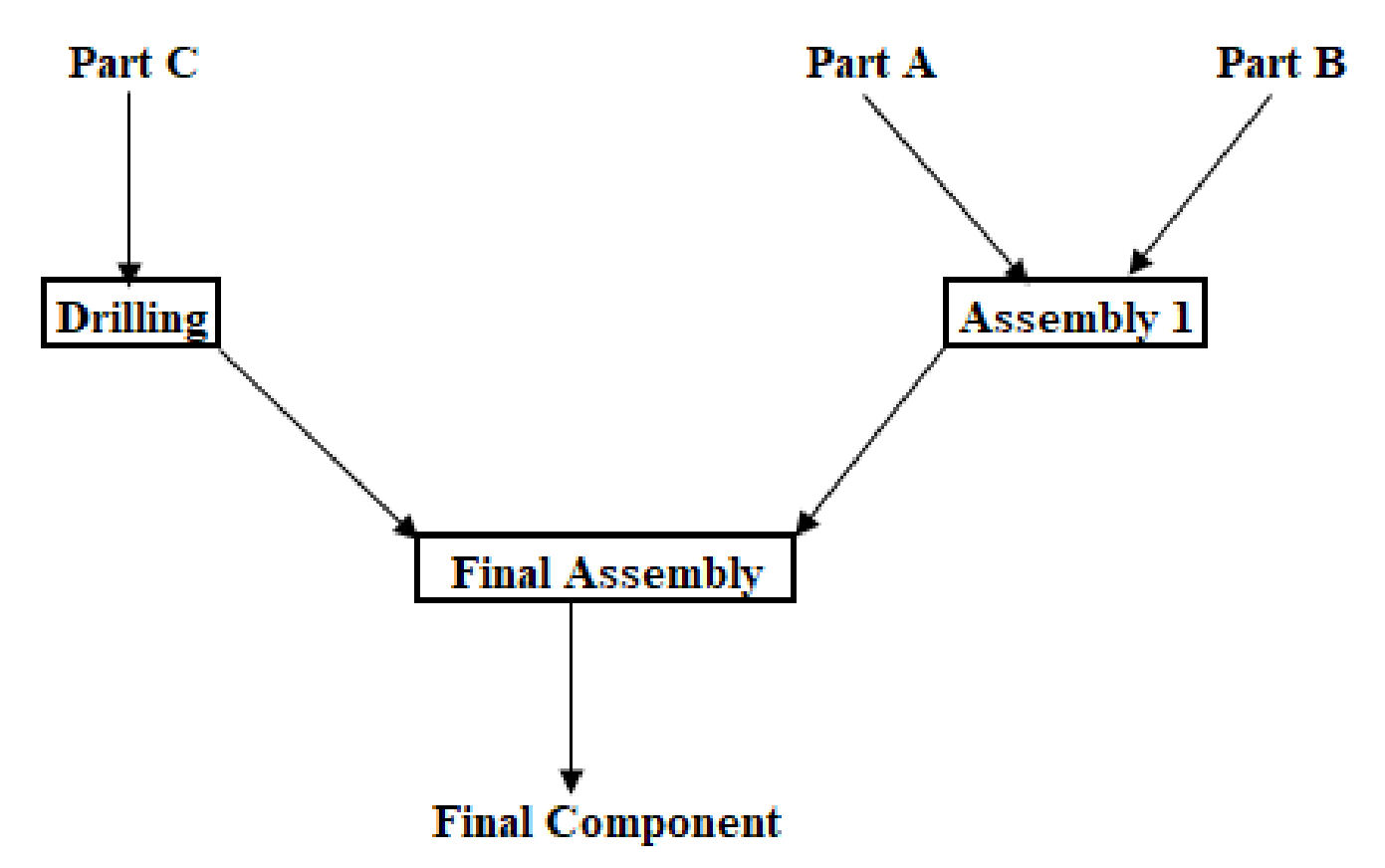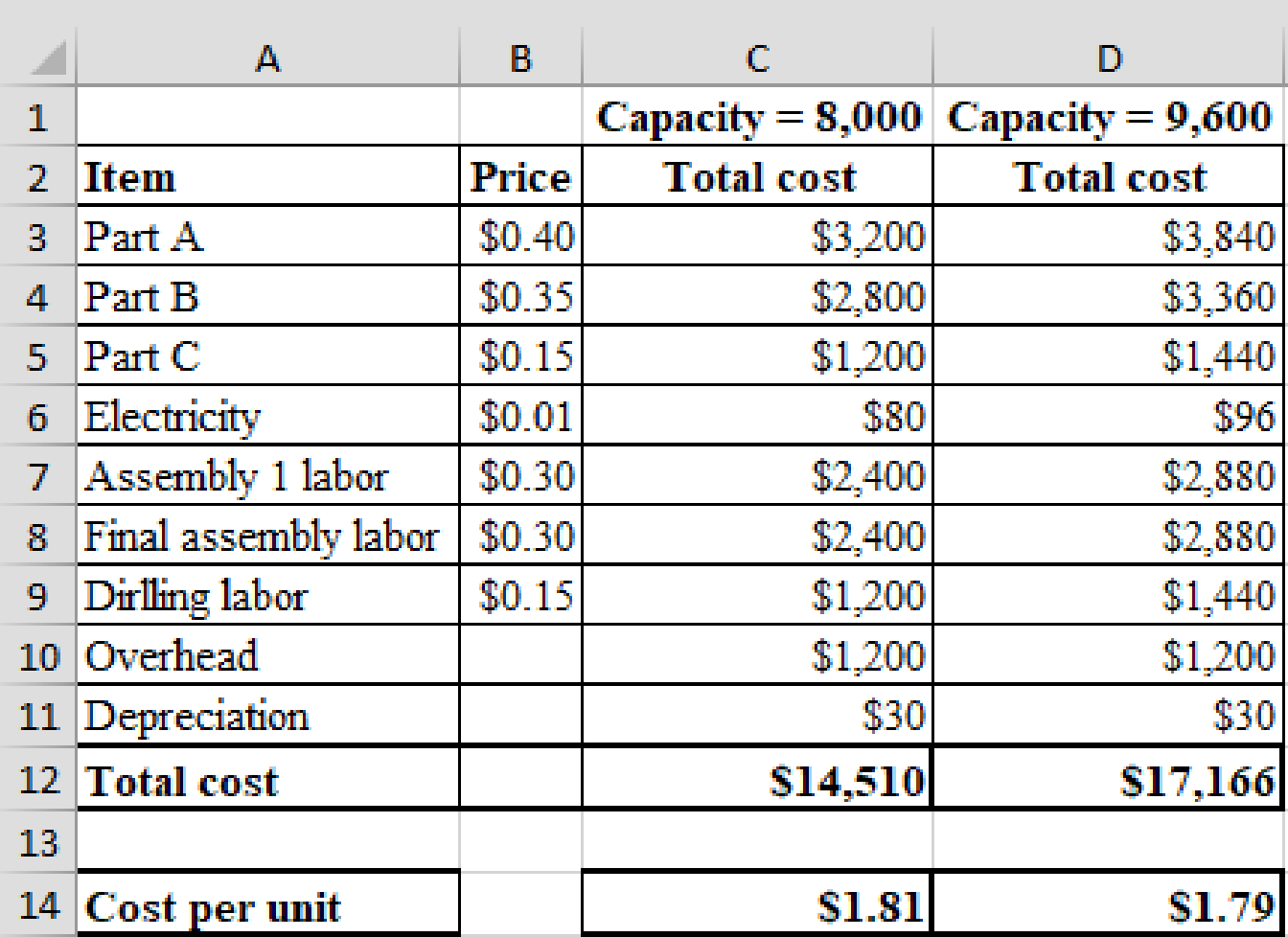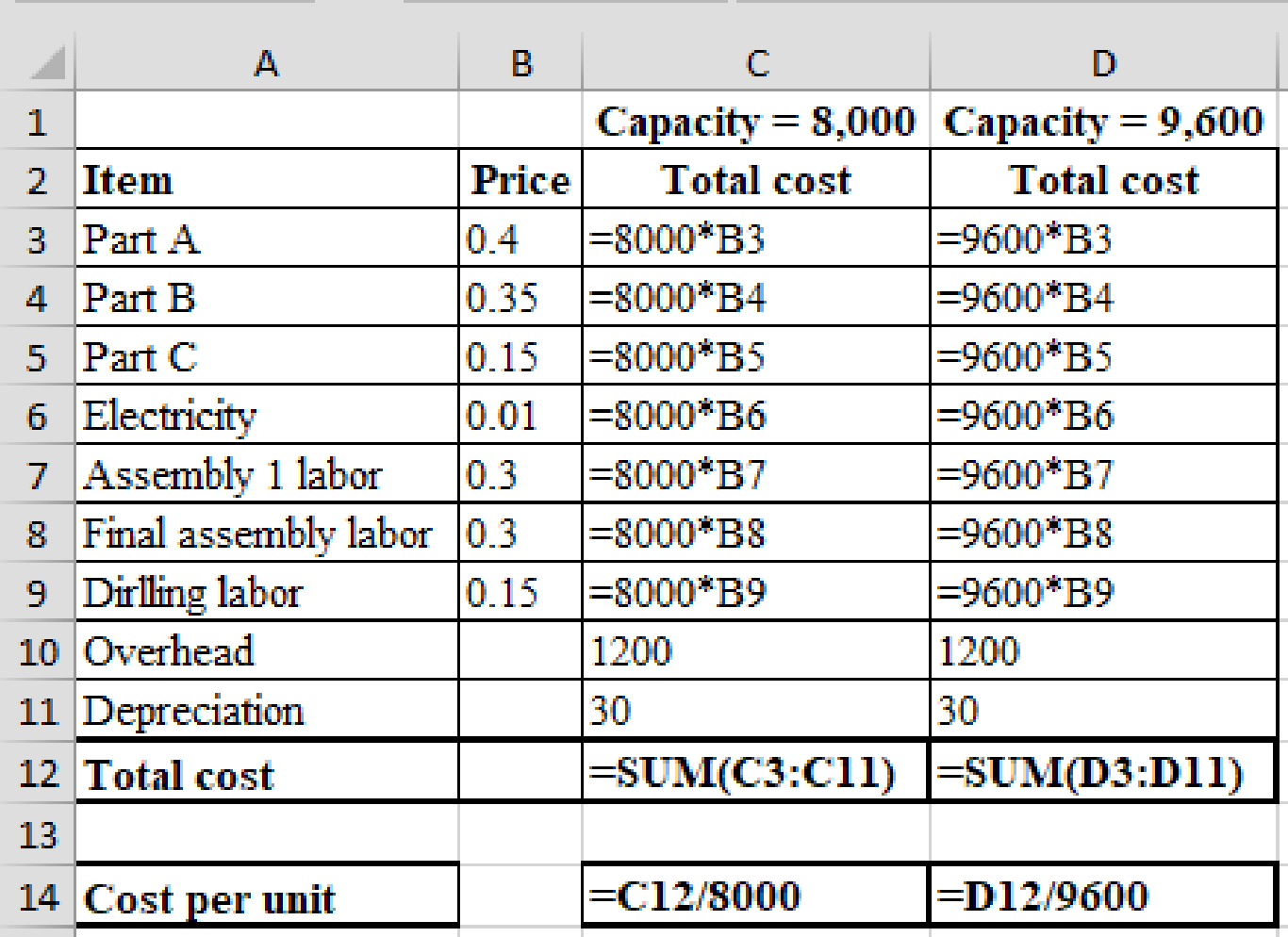
Concept explainers
a)
To draw: A process flow diagram and determine the processing capacity of the whole process.
Process capacity:
Process capacity is the maximum level of output can be possibly obtained through a specific machine of the production line.
a)
Explanation of Solution
Given information:
Hours = 8 per day
Days = 5 per week.
Cost of purchasing parts:
Part A = 40 cents per piece.
Part B = 35 cents per piece
Part C = 15 cents per piece.
Production output:
Assembly line 1 = 140 components per hour.
Operational drill machines = 3
Drilling Part C = 50 parts per hour.
Final assembly line = 160 components per hour.
Cost of production:
Assembly labor = 30 cents per part.
Drilling labor = 15 cents per part.
Cost of electricity = 1 cent per part.
Total overhead cost = $1,200 per week,
Process flow diagram:

Calculation of capacity:
The overall capacity of the process will be equal to the activity with the lowest individual capacity.
Hence, the capacity of the process is 5,600 units per week.
b)
To calculate: The new process capacity and identify the operation that limits the capacity.
b)
Explanation of Solution
Given information:
Hours = 16 per day
Days = 5 per week.
Number of shifts = 2 per day
Cost of purchasing parts:
Part A = 40 cents per piece.
Part B = 35 cents per piece
Part C = 15 cents per piece.
Production output:
Assembly line 1 = 140 components per hour.
Operational drill machines = 4
Drilling hours = 8 per day
Drilling Part C = 50 parts per hour.
Final assembly line = 160 components per hour.
Cost of production:
Assembly labor = 30 cents per part.
Drilling labor = 15 cents per part.
Cost of electricity = 1 cent per part.
Total overhead cost = $1,200 per week,
Depreciation cost for equipment = $30 per week
Calculation of capacity:
The overall capacity of the process will be equal to the activity with the lowest individual capacity. The capacity of the process is 8,000 units per week.
The drilling operation only works for 8 hours in a day limiting the overall capacity.
c)
To calculate: The new process capacity and identify the operation that limits the capacity.
c)
Explanation of Solution
Given information:
Hours for assembly line 1 = 16 per day
Hours of Final assembly line = 12 per day
Days = 5 per week.
Number of shifts = 2 per day
Cost of purchasing parts:
Part A = 40 cents per piece.
Part B = 35 cents per piece
Part C = 15 cents per piece.
Production output:
Assembly line 1 = 140 components per hour.
Operational drill machines = 5
Drilling hours = 8 per day
Drilling Part C = 50 parts per hour.
Final assembly line = 160 components per hour.
Cost of production:
Assembly labor = 30 cents per part.
Drilling labor = 15 cents per part.
Cost of electricity = 1 cent per part.
Total overhead cost = $1,200 per week,
Depreciation cost for equipment = $30 per week
Calculation of capacity:
The overall capacity of the process will be equal to the activity with the lowest individual capacity. The capacity of the process is 9,600 units per week.
The final assembly line only works for 4 hours in the second shift limiting the overall capacity.
d)
To calculate: The cost per unit for the previous two calculated capacities.
d)
Explanation of Solution
Given information:
Hours for assembly line 1 = 16 per day
Hours of Final assembly line = 12 per day
Days = 5 per week.
Number of shifts = 2 per day
Cost of purchasing parts:
Part A = 40 cents per piece.
Part B = 35 cents per piece
Part C = 15 cents per piece.
Production output:
Assembly line 1 = 140 components per hour.
Operational drill machines = 5
Drilling hours = 8 per day
Drilling Part C = 50 parts per hour.
Final assembly line = 160 components per hour.
Cost of production:
Assembly labor = 30 cents per part.
Drilling labor = 15 cents per part.
Cost of electricity = 1 cent per part.
Total overhead cost = $1,200 per week,
Depreciation cost for equipment = $30 per week
Calculation of cost per unit when the capacity is 8,000 and 9,600 units:

Formula:

e)
To calculate: The break-even number of units.
e)
Explanation of Solution
Given information:
Product selling price = $4 per unit.
Fixed cost per drilling machine = $30,000
Output per week = 8,000 parts
Number of drilling machines = 4
Product buying price = $3 per unit
Calculation of break-even number of units:
Let ‘x’ be the number of units each option will produce.
The cost of buying the unit becomes
When the firm decides to manufacture the part, it incurs a fixed for each of the drilling machines which will be:
The cost per unit for manufacturing as calculated before is $1.81.
Therefore the total cost of manufacturing the part is:
The total cost of buying and manufacturing is equated to each other to calculate the break-even units as shown below:
The break-even units are 100,840 units.
Want to see more full solutions like this?
Chapter 7 Solutions
Operations and Supply Chain Management (Mcgraw-hill Education)
- in the 2016 "ATB: Digital Disruption in the parking meter industry" case what recommendations would you give to adress the key issues outlined in the case?arrow_forward1) JIT McDonald’s Style (https://media.gaspar.mheducation.com/GASPARPlayer/play.html?id=46KGfedfilYlJzWH4XxxbLS) What challenges did McDonald’s face with its current operating system? 2. What are the five criteria that McDonald’s new “Made for You” operating system had to meet? 3. Describe how the “Made for You” operating system works.arrow_forwardThe first general topic debated in the SHRM Learning System centers around talent acquisition and retention. Discuss how talent is different from skills, and offer two strategies a human resources professional can pursue to recruit “talent” to an organization.arrow_forward
- What assumptions or biases do you have related to the case? Gather the facts. Known and to be gathered. Identify the stakeholders and their viewpoints. Include the values, obligations and interests of each of the stakeholders. Primary Secondaryarrow_forwardPerform an internal analysis using SWOT and VRIO analysis of the " ATB: Digital disruption in the parking meter industry" casearrow_forwardPerform a External analysis using PESTEL and Porters five force analysis on the "ATB: Digital disruption in the parking meter industry" casearrow_forward
- There was a most recent poll for which 571 adults that flew in the past year had info collected. This info was their number 1 complaints about flying. A - small cramped seat - 45 complaints B - cost - 18 complaints C - fear or dislike - 81 complaints D - security - 123 complaints E - Poor service - 12 complaints F - Conntected flight issue - 8 complaints G - overcrowded - 41 complaints H - Late and wait - 81 complaints I - Food - 5 complaints J - Lost/missing luggage - 5 complaints K - Other - 51 complaints What percentage of those surveyed found nothing they didnt dislike?arrow_forwardCan you help me with this, and explain what a product by value analysis is? Thanks in advancearrow_forwardOperations Management Questionarrow_forward
- can you explain and breakdown the "ATB: digital disruption in the parking meter industry" case in detail outlining the key issuesarrow_forwardAt Quick Car Wash, the wash process is advertised to take less than 6 minutes. Consequently, management has set a target average of 330 seconds for the wash process. Suppose the average range for a sample of 7 cars is 10 seconds. Use the accompanying table to establish control limits for sample means and ranges for the car wash process. Click the icon to view the table of factors for calculating three-sigma limits for the x-chart and R-chart. The UCLR equals seconds and the LCLR equals seconds. (Enter your responses rounded to two decimal places.)arrow_forwardIf Jeremy who is the VP for the operations, proceeds with their existing prototype (which is option a), the firm can then expect sales to be 120,000 units at $550 each. And with a probability of 0.52 and a 0.48 probability of 65,000 at $550. we However, he uses his value analysis team (option b), the firm expects sales of 75,000 units at $770, with a probability of 0.78 and a 0.22 probability of 65,000 units at $770. Value engineering, at a cost of $100,000, is only used in option b. Which option for this has the highest expected monetary value (EMV)? The EMV for option a is $? The EMV for option b is $? Which has the highest expected monetary value. A or B?arrow_forward
 Practical Management ScienceOperations ManagementISBN:9781337406659Author:WINSTON, Wayne L.Publisher:Cengage,
Practical Management ScienceOperations ManagementISBN:9781337406659Author:WINSTON, Wayne L.Publisher:Cengage, Operations ManagementOperations ManagementISBN:9781259667473Author:William J StevensonPublisher:McGraw-Hill Education
Operations ManagementOperations ManagementISBN:9781259667473Author:William J StevensonPublisher:McGraw-Hill Education Operations and Supply Chain Management (Mcgraw-hi...Operations ManagementISBN:9781259666100Author:F. Robert Jacobs, Richard B ChasePublisher:McGraw-Hill Education
Operations and Supply Chain Management (Mcgraw-hi...Operations ManagementISBN:9781259666100Author:F. Robert Jacobs, Richard B ChasePublisher:McGraw-Hill Education
 Purchasing and Supply Chain ManagementOperations ManagementISBN:9781285869681Author:Robert M. Monczka, Robert B. Handfield, Larry C. Giunipero, James L. PattersonPublisher:Cengage Learning
Purchasing and Supply Chain ManagementOperations ManagementISBN:9781285869681Author:Robert M. Monczka, Robert B. Handfield, Larry C. Giunipero, James L. PattersonPublisher:Cengage Learning Production and Operations Analysis, Seventh Editi...Operations ManagementISBN:9781478623069Author:Steven Nahmias, Tava Lennon OlsenPublisher:Waveland Press, Inc.
Production and Operations Analysis, Seventh Editi...Operations ManagementISBN:9781478623069Author:Steven Nahmias, Tava Lennon OlsenPublisher:Waveland Press, Inc.





